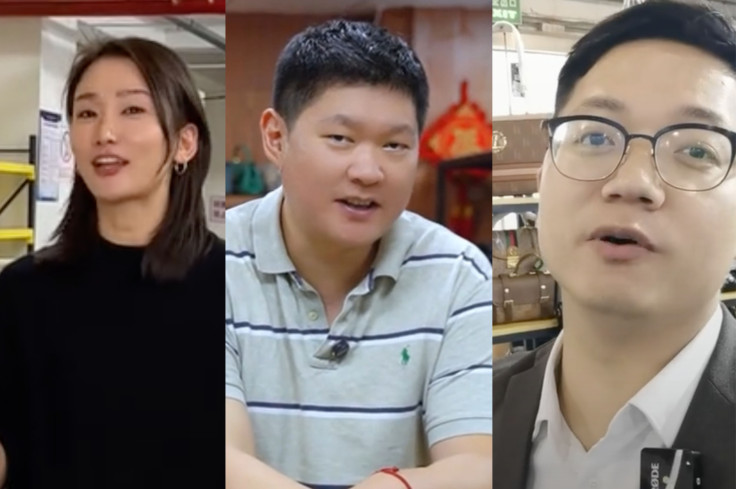
Chinese factories are taking to TikTok to expose luxury brands for allegedly misleading customers about the worth and origin of their items, effectively scamming them out of thousands of pounds. Several viral videos tell the same story: Chinese-made bags are produced cheaply and then sold by high-end brands for eye-watering prices. The trend has sparked outrage among Western consumers who feel duped after discovering they may have been paying thousands for goods made at a fraction of the cost. However, the timing of this wave of videos raises an important question — could this be a coordinated response to President Donald Trump's increased tariffs on Chinese imports?
Chinese Official Speaks Out About The Tariffs
Trump's recent decision to raise tariffs on Chinese products from 34% to 125% has been widely condemned. Xia Baolong — an official overseeing Hong Kong affairs — called the move 'extremely shameless' and warned that trade wars have 'no winners'. He also encouraged Vietnam to 'oppose unilateral bullying and uphold the stability of the global free trade system'.
During a televised address, Xia took a combative tone, claiming: 'Let those peasants in the United States wail in front of the 5,000 years of Chinese civilisation. The Chinese people do not cause trouble, nor are they afraid of trouble. Pressure, threats and blackmail are not the right way to deal with China.'
The remarks came just two days before Chinese manufacturers began posting videos on TikTok to expose luxury brands' reliance on Chinese manufacturing and promote buying directly from Chinese factories.
The Price Of A 'Made In Europe' Tag
@sen.bags_ we only offer the best quality to you
♬ original sound - SEN BAGS
One bag manufacturer, Wang Sen, has gained widespread attention for his viral videos. He claims that American customers are routinely charged thousands for items that are not worth their price tags.
In one video, Wang breaks down the actual production cost of a Hermes bag, usually sold for £28,613 ($38,000). He estimates the materials, labour, and packaging total around £1,054 ($1,400), claiming the price markup is largely due to the logo — not quality.
Wang also highlights a key misconception: products labelled 'made in China' are often dismissed as non-luxury, despite China being the manufacturing hub for 80% of the world's luxury handbags. According to Wang, many luxury brands transport nearly finished bags back to Europe just to repackage them and add their logos.
'If the label on your Hermes bag suddenly changed from "made in France" to "made in China", but everything else stayed the same — would you still see it as luxury?' Wang asks. 'If not, then you've been misled by branding for too long.'
He concludes: 'These bags are made in China by our intelligent and diligent artisans. Welcome to the real world. Be a real person. Buy a bag from our China factory.'
TikTokers Claim To Reveal Luxury Supply Chains
Other Chinese TikTokers have joined the trend. LunaSourcingChina has amassed millions of views by guiding viewers to Chinese factories that supply popular Western brands.
In one clip, she claims that leggings priced at hundreds by brands like Lululemon are available for £3–4 ($5–6) directly from manufacturers. In another, she alleges that Nike, Adidas, New Balance, and others use the same supplier — the Pou Chen factory, one of the world's largest shoe manufacturers.
She also features a woman who claims her factory produces goods for Chanel, MAC, Bobbi Brown, and La Prairie. The footage shows a full production line — but the clip cuts before the woman confirms whether these brands are indeed her clients.
Is This A Business Opportunity In Disguise?
The trend has left many wondering if these videos are a savvy marketing ploy. Wang, for instance, ends his exposés by promoting his own unbranded 'handcrafted luxury bags', raising questions about the motives behind his content.
Another TikToker, @lee_chinabusiness, shows off knock-offs of Louis Vuitton bags available for £37 ($50). He too plugs his own pet products business and tells viewers to 'buy from us directly'.
Although LunaSourcingChina does not disclose whether she is sponsored, her partner Goodiy — a jewellery brand — is heavily promoting pre-tariff sales. With items listed for under £4, she may benefit from encouraging consumers to switch to her recommended vendors.
Ultimately, these influencers are not pushing transparency — they are pushing their own profit. They don't want customers to buy directly from brand-authorised Chinese factories. They want them to buy cheaper alternatives and dupes from them instead.
@wangsen9999 Did you know that luxury brands are manufactured in China? #senbag #luxury #bags
♬ Presentation - FlyFlyMusic
The Aftermath Of Promoting Cheap Goods
Despite concerns about authenticity, the trend has had real results. Chinese e-commerce platform DHgate saw a 56% surge in downloads in just a few days — rising from No. 352 to No. 3 on the US iPhone App Store.
Brands like Lululemon have responded, urging customers to stick to official websites and stores for genuine products. However, some experts believe the TikTok trend is more than a cash grab — it may also be a calculated political tactic.
Could This Trend Be Political Retaliation?
Experts such as Alex Goldenberg of Rutgers University believe these videos are a coordinated pushback against US trade policies, showcasing Chinese manufacturing as 'cheaper, more desirable and accessible — even in defiance of trade restrictions'.
Some videos take a more radical tone. One TikToker says, 'You don't need a tariff, you need a revolution.' Wang's TikTok bio reads: 'No winner in tariff war.'
Some of Wang's most popular videos have been removed and re-uploaded, which he says keeps happening without explanation — possibly suggesting platform intervention.
What started as a simple wave of TikTok exposés has snowballed into something much larger: a hybrid of marketing strategy, social commentary, and political retaliation. Whether consumers choose to save money on a 'dupe' or remain loyal to high-end brands, one thing is certain — both sides in this luxury trade war have something to sell.







